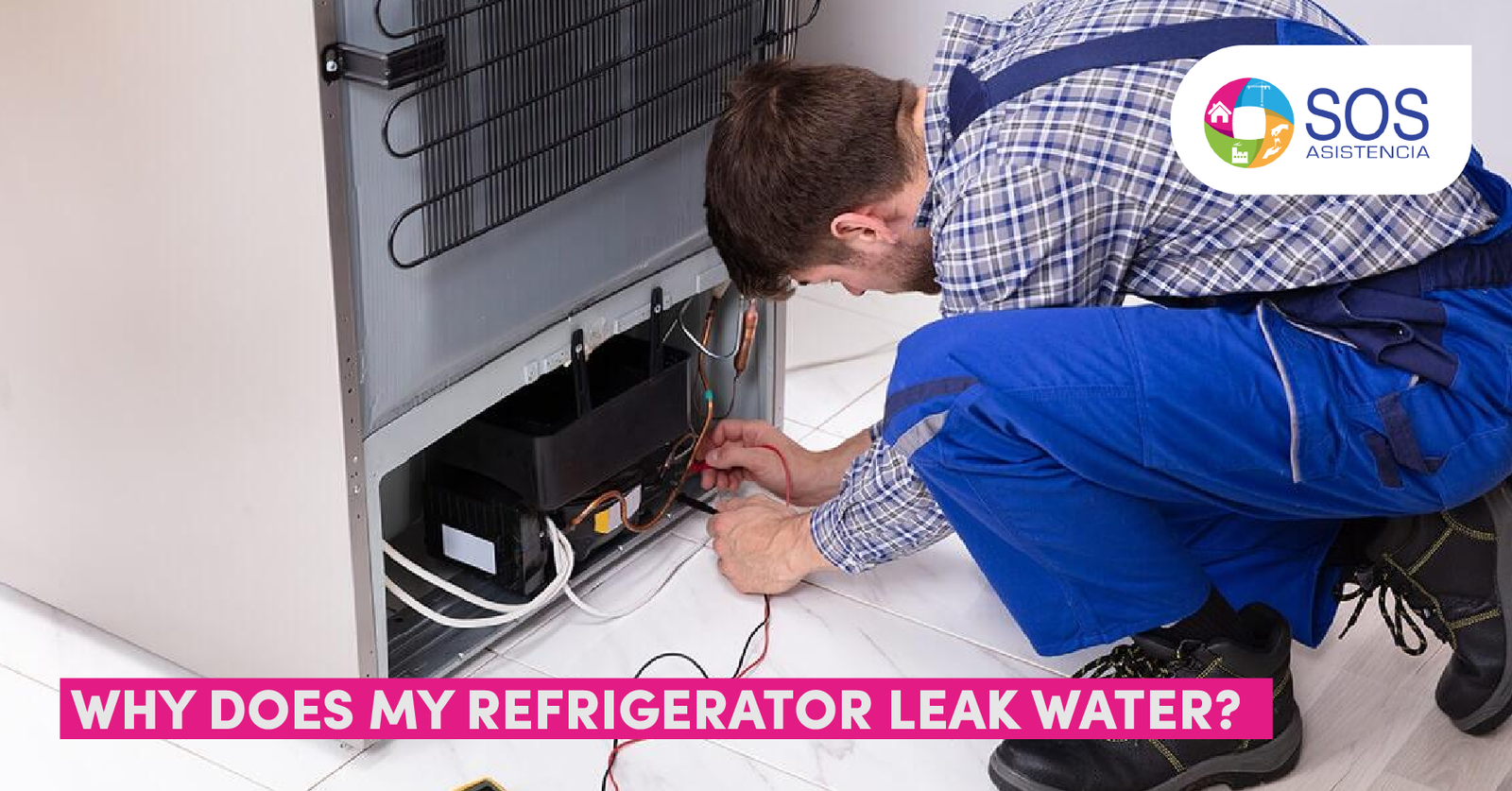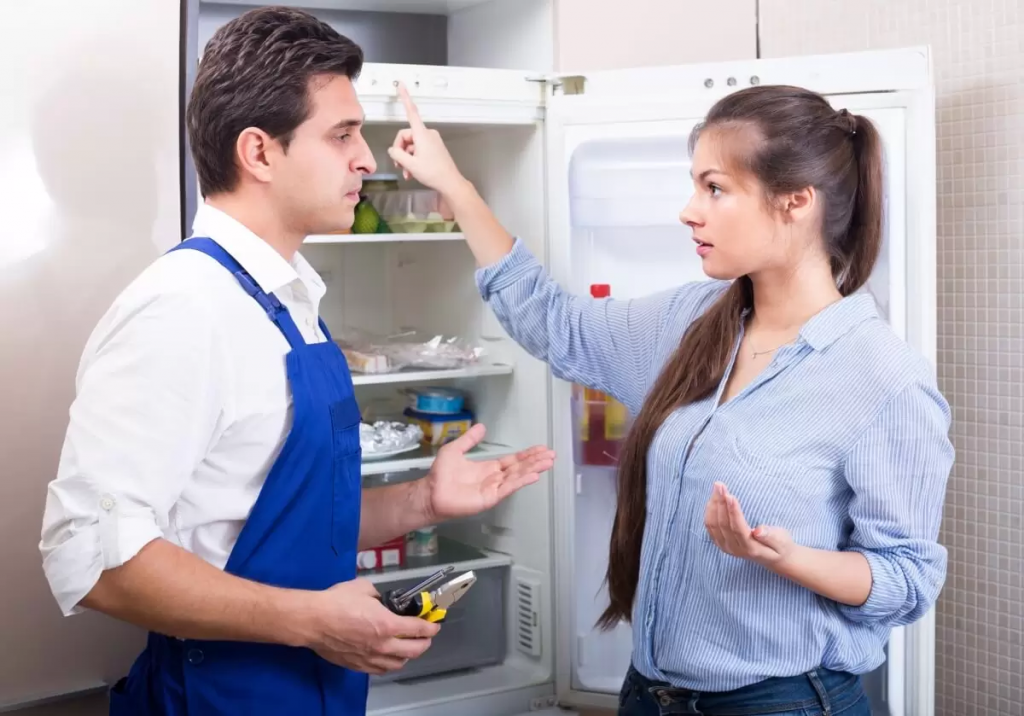Have you ever opened your refrigerator and noticed a small puddle of water inside? Don’t worry! This is a common thing that can happen and has a solution. In this blog, we’re going to explore the reasons behind water dripping in your fridge, how to prevent it, and when it’s time to consider a change. In addition, we will discover how this problem can affect your home and we will give you practical advice to solve it.
Why is my refrigerator leaking?
Condensation: The formation of condensation inside the refrigerator is a natural phenomenon that occurs due to temperature differences between the inside and outside of the appliance. When hot, humid ambient air comes into contact with cold surfaces inside the refrigerator, such as walls or shelves, the water vapor present in the air condenses and turns into liquid.
This process is similar to what happens when a cold surface, such as a glass of ice water, comes into contact with hot air and becomes covered in small water droplets. In the case of the refrigerator, condensation accumulates in the form of water droplets on the interior walls, shelves and other cold surfaces.
This can occur for several reasons, such as a clogged drain or excess condensation due to high ambient humidity. It is important to keep your refrigerator drain clean and make sure it is working properly to avoid drip problems and maintain the efficiency of the appliance.
- Clogged drain: Blockages in the refrigerator drain can be caused by various factors, and understanding these causes is essential to avoid problems such as dripping water and malfunctioning of the appliance. Below, we present the most common causes of this problem and of course, we explain how this affects the flow of water:
- Residue accumulation: This accumulation can obstruct the passage of water, preventing it from draining properly into the evaporation container. As a result, water can accumulate at the bottom of the refrigerator and eventually cause leaks or drips.
- Icing: Excessive icing on the evaporator can block the drain. When ice builds up, it prevents water melted during the defrost cycle from flowing into the drain, which can cause it to overflow and cause drips.
- Clogging by food particles: Food particles, such as pieces of fruits or vegetables, can accidentally enter the refrigerator drain and cause blockages.
- Drain Deterioration: Over time, your refrigerator drain can deteriorate due to sediment buildup, corrosion, or other factors. This can cause the drain to become narrow or completely blocked.
- Water line leaks: Here are some common places where refrigerator water line leaks can occur and how to identify them:
- Supply line connections: Check for signs of moisture or water droplets around these connections. If you notice any leaks, tighten the connections or replace the washers and gaskets to stop the water from escaping.
- Water inlet valve: The water inlet valve is responsible for regulating the flow of water into the refrigerator. Look for water pooling around the valve or drips coming from it. If you find any leaks, consider replacing the valve to fix the problem.
- Water Line Tubes: The tubes that make up your refrigerator’s water line can develop cracks, breaks, or deterioration over time, which can cause leaks. Visually inspect the tubes for signs of damage, such as cracks, dents, or water spots. If you find any abnormalities, replace the affected tubes to prevent future leaks.
- Defrost tray: Check if the tray is in its correct place and if there is any visible damage to it. Adjust or replace the tray if necessary.
How to prevent water dripping in the refrigerator:
- Regular Maintenance: The buildup of dirt, food residue, and ice can clog drain passages and cause water leaks. Therefore, it is crucial to regularly clean the refrigerator, including the shelves, drawers and trays, to remove any debris that could cause blockages. Also, be sure to periodically defrost the refrigerator to prevent excessive ice formation, which can clog drains and cause drip problems.
- Checking the drain: The drain can become clogged with food residue, dirt and ice, which can cause water leaks. To avoid this problem, it is important to regularly check and clean the refrigerator drain. You can do this by using a small brush or toothpick to remove any debris accumulated in the drain. Also, pour hot water and vinegar down the drain to clear any clogs and prevent future drip problems.
- Water Line Inspection: It is crucial to regularly check your refrigerator’s water line to detect potential problems and prevent leaks. You can do this by visually inspecting the water line for signs of damage, such as cracks, dents, or loose connections. If you encounter any problems, consider replacing the water line or tightening the connections to fix the problem and prevent future leaks.
Impact at home
- Potential damage: When water accumulates on the floor it can cause long-term damage such as warping of wooden floors, deterioration of tiles and the appearance of damp spots. Additionally, if water seeps under kitchen cabinets, it can cause structural damage, such as swelling of wooden boards and corrosion of metal materials. These damages not only affect the aesthetics of the kitchen, but can also compromise the safety and functionality of the space.
- Safety Risks: On the one hand, standing water can become a breeding ground for bacteria, mold and mildew, plus standing water increases the risk of slips and falls, especially on slippery surfaces like the kitchen floor. Children, older adults and pets are especially susceptible to accidents in areas with standing water, which can result in serious injuries.
- Additional Costs: Repairing or replacing damaged floors, kitchen cabinets, and other affected items can be expensive and require considerable time and effort. Additionally, water damage may not be covered by home insurance if it is deemed to be the result of poor maintenance or neglect. Therefore, it is crucial to take preventive measures to avoid water dripping from the refrigerator and the associated damage. By regularly cleaning your refrigerator, inspecting internal components, and proper maintenance, you can prevent drip problems and protect the integrity and value of your property.
Tips that SOS Assistance gives you:
- Remember the importance of addressing the problem of dripping water from the refrigerator in a timely manner to avoid further damage.
- Always keep in mind the convenience of having a professional maintenance service to guarantee the proper functioning of your refrigerator.
- When selecting a new refrigerator, check that it fits your needs and budget. Consider size, energy efficiency, and additional or main functions or features.
With these tips, you can keep your refrigerator in optimal condition and prevent water from dripping into your home!
We hope this blog has provided you with valuable information on why your refrigerator is leaking water and how to solve this problem effectively. Remember that at SOS Asistencia we are here to help you with any repair or maintenance needs in your home. Contact us today and let our experts take care of your refrigerator!
If you were interested in this topic, we invite you to read the following blog: practical tips for addressing common home repairs










Leave A Comment